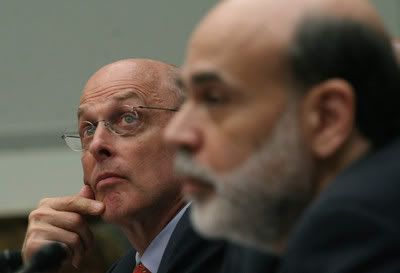Hossein Askari is professor of international business and international affairs at George Washington University.
Noureddine Krichene is an economist at the International Monetary Fund and a former advisor, Islamic Development Bank, Jeddah.
The view around the world of the banking crisis and Paulson’s bailout proposal appears to be much less as panicky as closer to home, if at all, and more of recognition of the realities of the situation with a general attitude of encircling and isolating a cancer to keep it localized.
Paulson Plan Throws Oil On Fire
  and Federal Reserve Chairman Ben Bernanke |
Asia Times
With the creation of the so called Mortgage and Financial Institutions Trust (MFI), the unfolding financial crisis, considered by many to be the worst in over 60 years, has become ever-more dangerous.
While such an institution has not existed in any country, the MFI could prove to be disastrous for US public finance, economic growth, the dollar, relations with major foreign holders of dollars, the global financial system, and could ignite the worst inflation in the economic history of the United States and reverse globalization to levels not seen since the Great Depression.
The initial cost of the MFI, put at US$700 billion, could easily escalate to trillions of dollars. At the same time, the Congressional Budget Office had previously projected a record fiscal deficit of US$500 billion for 2009. The MFI will further blow up the deficit to an unprecedented level, exceeding US$1.4 trillion. US debt, jumping with the takeover of Fannie Mae and Freddie Mac to 86% of GDP, has moved to an unsustainable level.
The financing of previous large fiscal deficits under the George W Bush Administration has already caused external deficits (current account) to widen to 5-7% of GDP, turned national savings negative, sent the dollar plummeting, and ignited rapid inflation, particularly in food, energy, and housing prices. Further financing of extraordinary large fiscal deficits, as required by the MFI, can only disrupt economic stability both in the US and world-wide. It will only further undermine the dollar, exacerbate widening external deficits, soaring energy and food prices, and rising unemployment.
Nonetheless, the main architects of the MFI, Messrs Henry Paulson and Ben Bernanke, Treasury Secretary and Federal Reserve chairman respectively, are determined to protect Wall Street. They have decidedly transformed the US budget and the US central bank into vehicles that only care for the welfare of Wall Street and divert public resources to bankers, under the guise of protecting the economy and averting systemic risk.
Albeit evidence of a systemic risk has not been established, vast public resources have so far been devoted to bailouts at the expense of growth-generating spending. The Fed has been pouring billions of dollars into financial institutions, buying worthless paper, and incurring huge losses. To quote Paulson “I am convinced that this bold approach [that is creation of the MFI] will cost American families far less than the alternative – a continuing series of financial-institution failures and frozen credit markets unable to fund economic expansion.”Contrary to Paulson’s claim, domestic credit is still expanding at a fast rate, at 9% per year as of July 2008, and the notion of frozen markets cannot be supported by Fed’s published monetary data. Banks have excess liquidity and are still extending loans to safe customers. Certainly they are no longer in the mood of reigniting a new speculative euphoria by lending to speculator and impaired credit.
And contrary to Paulson’s belief, the MFI will in the end cost American families more than other alternatives.
[snip…]
All of this cannot but impair the global financial and economic reputation of the US. Just in a matter of days the dollar has declined from $1.39 to $1.48 to the euro, oil has climbed from $90 to over $120 (at one point rising by more than $20 in one day, September 22) and gold has jumped from $750 per ounce to over $900 .
The declining value of the dollar will adversely affect the value of foreign holdings in the US. China Investment Corporation (CIC) and a number of other sovereign wealth funds are major stakeholders in US financial and non-financial sectors, as holders of US government securities, debt of Fannie Mae and Freddie Mac, and owners of manufacturing companies.
Asia and Persian Gulf oil exporters will no longer continue to trust the United States with their money. Financial trust, a needed but already a rare commodity in finance, will evaporate. Countries will withdraw from participating in the global financial system and autarchy will once again raise its ugly head. Moreover, oil exporters with large financial surpluses, Kuwait, Qatar, Saudi Arabia and the United Arab Emirates, may cut back their oil exports. Why would they want to sell their depleting oil reserves for worthless paper?
Read the entire article here… (it’s worth it)

2 comments
Author
Author
buried in an article about Dick Cheney and an administration team mounting a “jawboning” offensive on Capital Hill to try to ratchet up the pressure to pass a bailout bill quickly, a direct admission from Tony Fratto that the White House has been formulating the bailout plan for some months now… that it it not as people have been led to believe something they came up with quickly.
Meaning they’ve known about the problems for quite awhile but have kept it to themselves waiting for what they hoped was a politically opportune moment:
hat tip to Marcy as EmptyWheel for this, who also has three questions:
Yeah, and Bush is “concerned” about Main Street, not Wall Street. He said so the other day…. :-/
I’d be concerned about Main Street too, if I were him. I’d probably ride in armored cars, as a matter of fact.